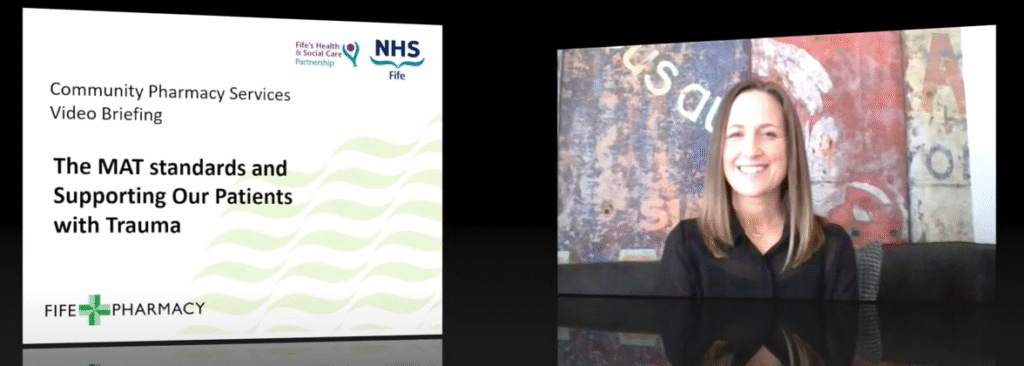Drug related deaths and harms are at record levels in Scotland and in NHS Fife we acknowledge that a coordinated response across services, professions and organisations is required to tackle this public health emergency. The Scottish Government have published a set of guidelines called the Medication Assisted Treatment (MAT) standards which describe what is needed to deliver safe and effective treatment for people who use drugs in Scotland. Our pharmacist, Vikki Laing, introduces these standards, discusses psychological trauma and drug related deaths in the following video:

Summary of the Standards
- All people accessing services have the option to start MAT from the same day of presentation.
- All people are supported to make an informed choice on what medication to use for MAT, and the appropriate dose.
- All people at high risk of drug-related harm are proactively identified and offered support to commence or continue MAT.
- All people are offered evidence based harm reduction at the point of MAT delivery.
- All people will receive support to remain in treatment for as long as requested.
- The system that provides MAT is psychologically informed (tier 1); routinely delivers evidence-based low intensity psychosocial interventions (tier 2); and supports individuals to grow social
- All people have the option of MAT shared with Primary Care.
- All people have access to independent advocacy and support for housing, welfare and income needs.
- All people with co-occurring drug use and mental health difficulties can receive mental health care at the point of MAT delivery.
- All people receive trauma informed care.
More information on the MAT standards can be found here.
Supporting People with Psychological Trauma
Community Pharmacy Teams are ideally placed to support people with their treatment and play a crucial role in the frontline delivery of substance use services. This is why it’s important that you have an awareness of the MAT standards, as they provide guidance on how all services can provide high quality, evidence-based, person-centred care.
Sadly, a history of complex trauma including adverse childhood experiences is strongly associated with problem drug use. This can have a significant and prolonged impact on an individual’s future so one of the ways pharmacy teams can best support people who use drugs (and other patients/people) is to adopt a ‘trauma-informed’ approach (MAT Standard 10: Trauma Informed Care). Improving your understanding of trauma can help you offer the kind of relationship that promotes recovery and builds resilience. NHS Education for Scotland (NES) have produced a set of resources called the National Trauma Training Programme to help achieve the vision of the government for a “trauma-informed and responsive nation and workforce” which can be accessed here: National trauma training programme | TURAS | Learn (nhs.scot).
